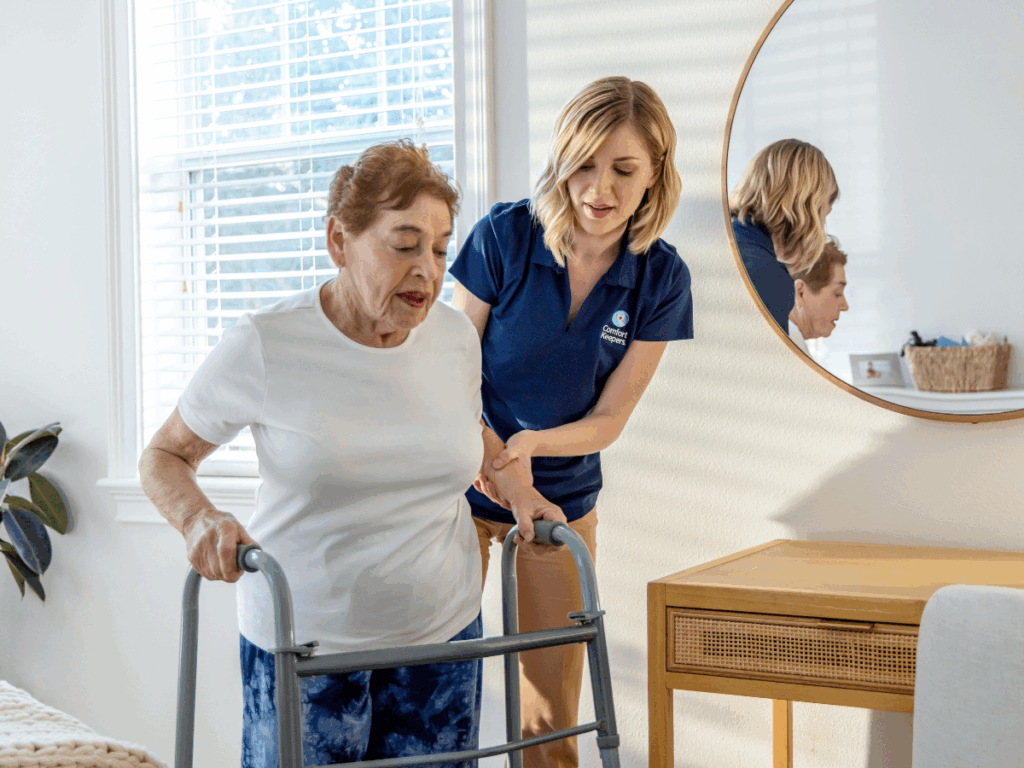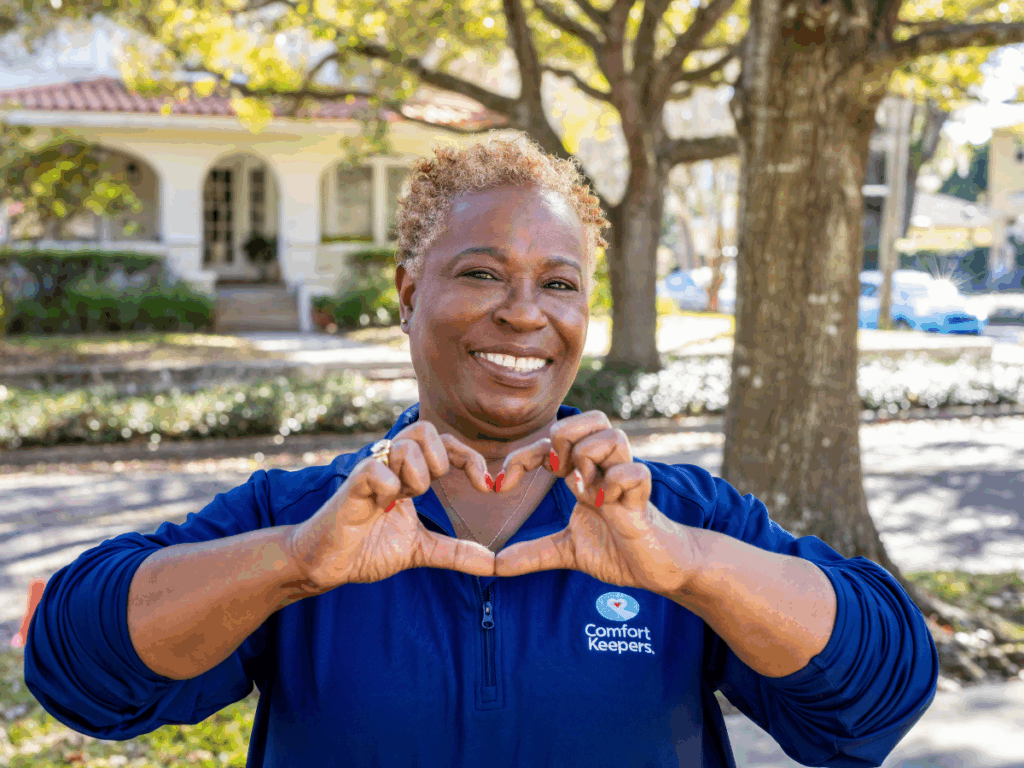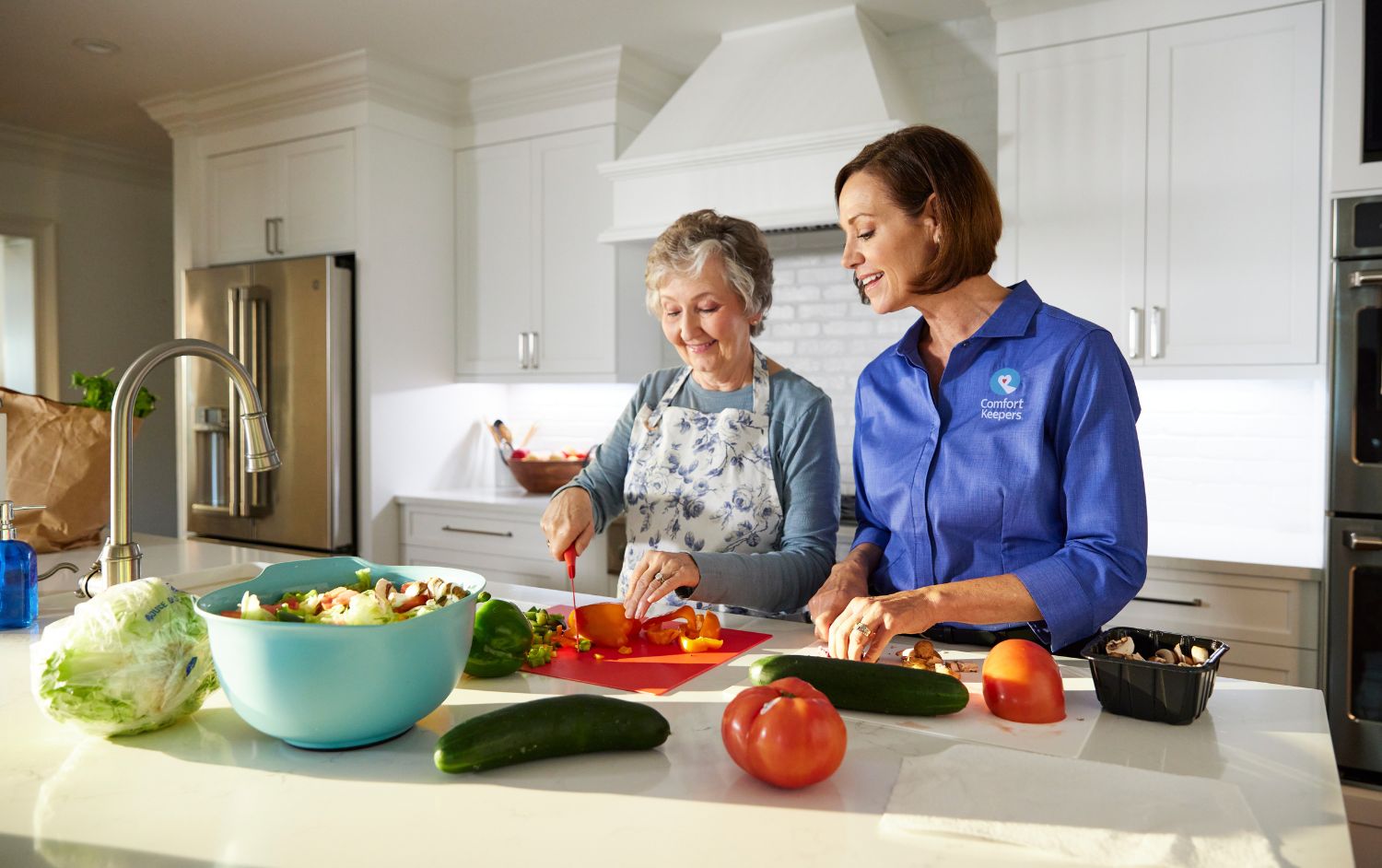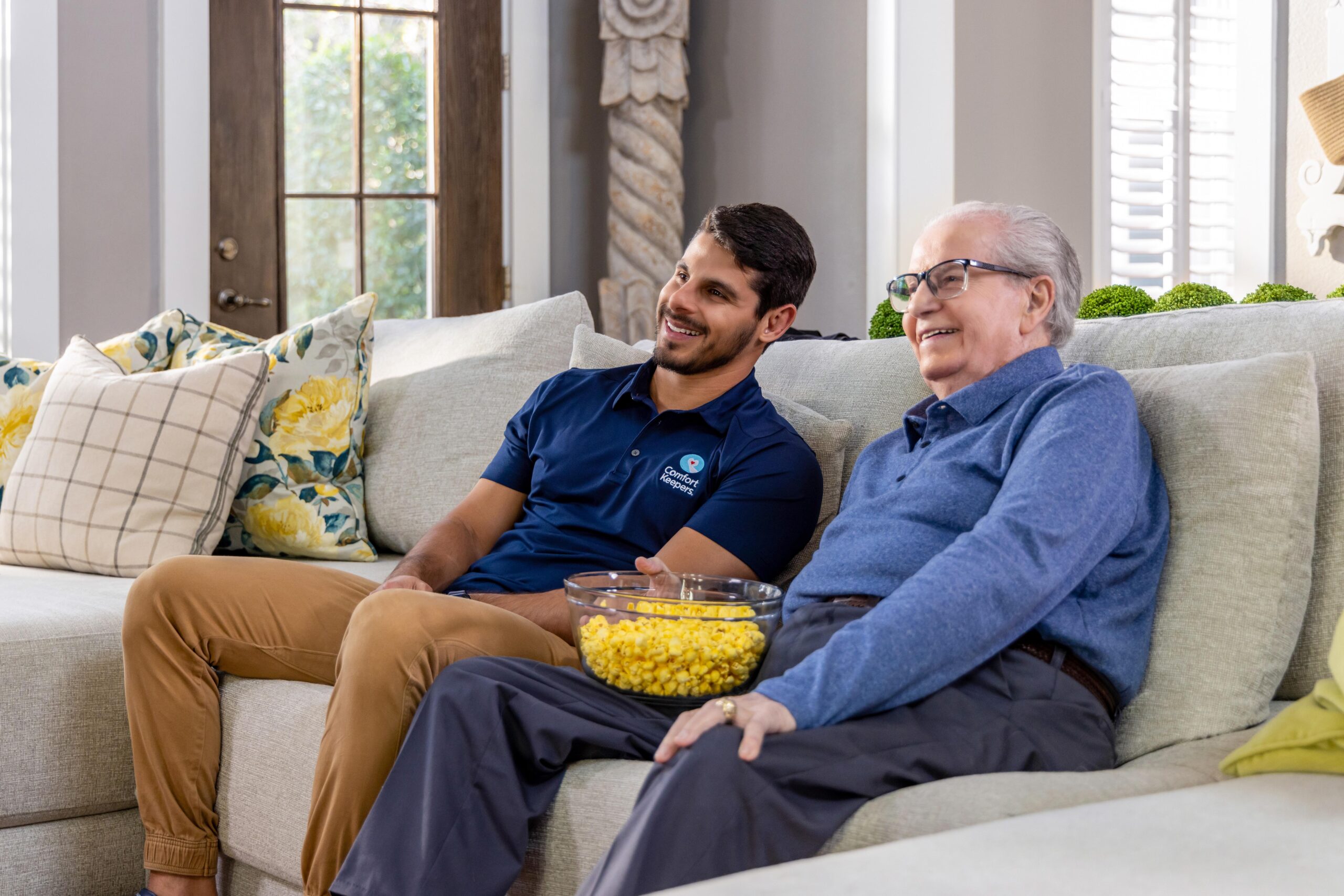The Silent Struggle: Why General Caregiving Falls Short for Complex Needs
TriCities Senior Homecare | October 20, 2025
Imagine a beloved family member, vibrant and independent, now navigating the complexities of dementia, the unpredictable movements of Parkinson’s, or the daily challenge of severe mobility issues. As their needs grow, the desire to keep them comfortable and safe at home intensifies. Many families initially believe that any compassionate caregiver can provide the help needed. After all, isn’t caring simply about kindness and assistance?

While empathy is the cornerstone of all care, the truth is, not all care is created equal, especially when conditions like dementia, Parkinson’s, or severe mobility limitations are involved. These aren’t just “senior moments” or simple movement difficulties; they are complex neurological conditions that demand a specific skillset and deep understanding that goes far beyond general caregiving.
If you’ve felt a growing unease that despite a caregiver’s best intentions, something crucial might be missing, or that challenges are escalating rather than easing, you’re not alone. This is often the quiet signal that it’s time to explore specialized training. Understanding this distinction isn’t just about finding help; it’s about unlocking a higher quality of life, preserving dignity, and ensuring genuine safety for your loved one.
Decoding the Conditions: What Makes Dementia, Parkinson’s, and Mobility Issues Unique?
To truly appreciate why specialized training is essential, let’s briefly look at what makes these conditions so intricate. It’s the specific changes they bring to the brain and body that fundamentally alter how care needs to be delivered.
Dementia: More Than Just Memory Loss
Dementia, encompassing conditions like Alzheimer’s, isn’t just about forgetting names or where the keys are. It’s a progressive decline in cognitive function that impacts judgment, reasoning, communication, and behaviour. For a person with dementia:
- Communication becomes a maze: They may struggle to find words, understand complex sentences, or interpret social cues. What seems like defiance can be confusion.
- Reality shifts: Hallucinations, delusions, or a distorted sense of time and place are common.
- Behavioral changes: Agitation, wandering, repetition, or “sundowning” (increased confusion and agitation in the late afternoon/evening) are often manifestations of their cognitive struggles, not intentional defiance.
- Executive function declines: Simple tasks like dressing or eating become overwhelming multi-step processes.
Parkinson’s Disease: Beyond the Tremor
Parkinson’s is a progressive neurological disorder primarily affecting movement. It stems from a loss of dopamine-producing brain cells. While the visible tremor is often the most recognized symptom, Parkinson’s involves a much broader array of challenges:
- Motor symptoms: Rigidity (stiffness), bradykinesia (slowness of movement), postural instability (impaired balance), and “freezing of gait” (a sudden, temporary inability to move forward) are common. These make walking, standing, and even getting out of a chair incredibly difficult and risky.
- Non-motor symptoms: These can be as debilitating as motor symptoms and often include cognitive changes (including Parkinson’s-related dementia), sleep disorders, depression, anxiety, and speech difficulties (dysarthria).
- Medication timing is critical: “On-off” fluctuations related to medication schedules can dramatically change a person’s mobility and clarity throughout the day.
Severe Mobility Issues: A Spectrum of Challenges
Whether independent of, or compounded by, dementia or Parkinson’s, severe mobility issues present their own set of complex care needs. This can be due to stroke, arthritis, advanced frailty, or injury.
- Increased fall risk: Weakness, poor balance, and dizziness make every movement a potential hazard.
- Transfer difficulties: Moving from bed to chair, or to the toilet, requires precise techniques to prevent injury to both the senior and the caregiver.
- Pressure injury risk: Prolonged sitting or lying without proper repositioning can lead to painful and dangerous bedsores.
The key insight here is that these conditions alter the very blueprint of a person’s daily functioning. A general caregiver, no matter how kind, might interpret a “frozen” gait as stubbornness, or agitation as anger, leading to responses that are ineffective or even harmful.
The Hidden Risks: When Unspecialized Care Just Isn’t Enough
Relying on general caregiving skills for specialized needs can lead to a cascade of preventable problems, impacting safety, well-being, and even accelerating decline. It’s not about fault; it’s about the limits of untrained compassion.
1. Increased Safety Hazards
Without specialized training, caregivers may unintentionally put a loved one at risk.
- Falls: A general caregiver might try to rush a person with Parkinson’s, inadvertently triggering a “freezing” episode and a fall. They might not know how to safely use adaptive equipment like walkers or lifts, or how to perform proper transfer techniques.
- Medication Errors: For Parkinson’s, precise medication timing is paramount. Incorrect timing can lead to debilitating “off” periods or dyskinesia. A general caregiver might not recognize the subtle signs of medication side effects or the importance of strict adherence.
- Choking & Aspiration: For those with dementia or advanced Parkinson’s, swallowing difficulties (dysphagia) are common. An untrained caregiver might not know how to prepare appropriate food textures or recognize signs of choking, leading to serious aspiration pneumonia.
2. Accelerated Decline & Frustration
- Cognitive & Behavioral Escalation: A caregiver unfamiliar with dementia-specific communication might correct or argue with a confused senior, leading to increased agitation or withdrawal. This can escalate challenging behaviors rather than de-escalate them, contributing to emotional distress and rapid cognitive decline. (Source: Parkinson’s Foundation, “10 steps for caring for Parkinson’s dementia, adapted from Alzheimer’s Association”)
- Loss of Mobility & Independence: Without knowing specific cuing techniques for Parkinson’s or appropriate exercise encouragement, a senior’s mobility can decrease faster than necessary, leading to increased dependency and a loss of confidence.
3. Compromised Dignity & Quality of Life
When unique needs aren’t understood, a person can feel misunderstood, frustrated, and lose their sense of self. Care should foster independence and well-being, not just address basic needs. Unspecialized care often misses opportunities for engaging activities, proper communication, and respectful interactions tailored to their specific condition.
4. Caregiver Burden on Families
Families often step in, trying to bridge the gap in care, leading to immense stress and burnout. They may feel guilty, overwhelmed, and constantly worried about their loved one’s safety. This burden can be significantly lightened when truly specialized care is in place.

The Pillars of Specialized Training: Skills That Transform Care
Specialized caregivers aren’t just compassionate; they are equipped with a toolkit of knowledge and techniques that allow them to anticipate, adapt, and respond effectively to the nuanced challenges of dementia, Parkinson’s, and severe mobility issues. This training translates directly into improved safety, dignity, and a better quality of life.
1. Advanced Communication Strategies
- For Dementia: Specialized caregivers understand that logic often doesn’t work. They use techniques like validation, where they acknowledge the senior’s feelings and reality, even if it differs from actual reality, to reduce distress. They master redirection, gently guiding attention away from upsetting topics, and use simplified language, one-step commands, and non-verbal cues to connect. Learning these skills is paramount for effective dementia and Alzheimer’s Care.
- For Parkinson’s: They adapt to speech difficulties (dysarthria) by practicing patience, encouraging deliberate speech, and providing clear, specific verbal cues for movement.
2. Expert Mobility & Safety Protocols
This is where specialized training truly shines in preventing falls and promoting independence.
- Safe Transfer Techniques: They are skilled in advanced body mechanics, knowing precisely how to assist with transfers (bed to chair, toilet) using techniques like pivot transfers or, when necessary, safely operating adaptive equipment like Hoyer lifts, minimizing injury risk for everyone.
- Overcoming “Freezing of Gait”: For Parkinson’s, they know specific cuing techniques – visual cues (e.g., placing a foot marker), auditory cues (e.g., counting, rhythmic commands), or tactile cues – to help a person restart movement during a freezing episode, preventing falls.
- Fall Prevention: Beyond basic safety checks, they perform ongoing fall risk assessments, adapt the environment proactively, and understand how to encourage movement within safe limits.
- Pressure Injury Prevention: They know proper repositioning schedules and techniques to prevent bedsores for those with limited mobility.
3. Behavioral & Cognitive Support
Specialized caregivers are trained to see beyond the behavior to the underlying need.
- De-escalation: They can identify triggers for agitation in dementia and use calm, reassuring approaches to de-escalate situations, preventing outbursts and fostering a peaceful environment.
- Creating Structure & Routine: They understand the importance of predictable routines for reducing confusion and anxiety in dementia.
- Cognitive Engagement: They can facilitate appropriate cognitive activities, from simple memory games to engaging in familiar hobbies, tailored to the individual’s current abilities, promoting mental stimulation.
4. Medication Management Acumen
For conditions like Parkinson’s, medication timing is as crucial as the medication itself.
- Specialized caregivers understand the critical “on-off” periods, monitor for specific side effects (like dyskinesia or impulse control disorders), and diligently report changes to medical professionals.
5. Nutrition & Swallowing Care
- They are vigilant for signs of dysphagia (difficulty swallowing) and know how to prepare modified diets (e.g., pureed, thickened liquids) to prevent choking and ensure adequate nutrition.
Many of these skills are part of Comfort Keepers Tricities’ comprehensive Personal Care services, but specialized training ensures they are applied with precision and understanding of the underlying condition. This is particularly vital in Dementia and Alzheimer’s Care, where communication and behavioral support are key.
Empowering Your Search: How to Vet for Truly Specialized Caregivers
As a family, you are your loved one’s strongest advocate. Knowing what to look for and what questions to ask is paramount in securing truly specialized care. Don’t settle for vague answers; demand specificity.
Here’s a “Specialized Caregiver Vetting Checklist” to guide your conversations with agencies and individual caregivers:
Questions for the Agency:
“What specific training programs do your caregivers undergo for dementia, Parkinson’s, and severe mobility issues?”
- Look for answers that detail specific curricula, certifications (e.g., specialized dementia certifications, Parkinson’s Foundation resources), and ongoing professional development.
“How do you assess a caregiver’s proficiency in specialized techniques, such as safe transfers for clients with Parkinson’s rigidity or de-escalation for dementia agitation?”
- Look for practical assessments, not just theoretical knowledge. Do they use role-playing or supervised practice?
“Can you provide examples of how your caregivers adapt their approach when a client has co-occurring conditions, like dementia and Parkinson’s?”
- This addresses the “overlap” challenge, a critical differentiator.
“How do you ensure continuity of care, especially with complex medication schedules or evolving behavioral challenges?”
- Look for structured communication between caregivers, clear care plans, and supervisory oversight.
Questions for the Caregiver (during an interview):
“Imagine Mrs. Smith, who has advanced dementia, is repeatedly asking to go home to her childhood house. How would you respond?”
- Listen for validation and redirection techniques, not logical explanations or arguments.
“Mr. Jones, who has Parkinson’s, suddenly ‘freezes’ while walking to the bathroom. What’s the first thing you would do, and what specific cues would you use to help him restart?”
- Look for knowledge of visual/auditory cues, patience, and safety prioritization.
“Describe a time you’ve had to assist someone with severe mobility issues with a challenging transfer. What steps did you take to ensure their safety and dignity?”
- Look for details on body mechanics, communication, and use of assistive devices.
“What are some common triggers for agitation in dementia patients, and what strategies do you employ to prevent or manage them?”
- Look for understanding of environmental factors, routines, and non-pharmacological interventions.
Red Flags to Watch Out For:
- Vague Answers: “Oh, we handle all kinds of care,” or “Our caregivers are just naturally good with seniors.”
- No Specific Training: Claims of experience without any mention of formal, condition-specific training or certifications.
- Over-reliance on Medication: Suggesting that difficult behaviors can always be “fixed” with medication, rather than behavioral techniques.
- Lack of Adaptability: A rigid approach to care that doesn’t acknowledge the fluctuating nature of these conditions.
To start this journey and discuss your specific needs, consider an initial consultation with Comfort Keepers Tricities.
The Transformative Impact of Specialized Care
Choosing a specialized caregiver isn’t just a preference; it’s a profound investment in your loved one’s well-being and your family’s peace of mind. The benefits are tangible and far-reaching:
- Enhanced Safety & Fewer Incidents: Specialized caregivers significantly reduce the risk of falls, medication errors, and other complications, leading to a safer home environment and fewer hospitalizations.
- Preserved Dignity & Autonomy: By understanding the unique challenges, specialized caregivers help seniors maintain as much independence as possible, allowing them to participate actively in their lives, fostering a sense of control and self-worth.
- Improved Quality of Life: Tailored engagement, effective communication, and compassionate support lead to reduced anxiety, more positive interactions, and a richer, more comfortable daily existence. They focus on elevating the human spirit.
- Reduced Family Stress & Burnout: Knowing your loved one is in expert, capable hands provides immense relief. This support allows families to shift from being overwhelmed caregivers to cherished family members again. For families needing a break, [Respite Care] from specialized caregivers can offer invaluable support.
- Slower Progression of Decline: While these conditions are progressive, specialized care can help manage symptoms more effectively, adapt to changes, and maintain functional abilities for longer.
Frequently Asked Questions About Specialized Care
Q: What’s the main difference between general and specialized care?
A: General care focuses on basic needs and companionship, assuming relatively stable cognitive and physical abilities. Specialized care, however, involves in-depth training on specific conditions like dementia or Parkinson’s, providing caregivers with advanced techniques for communication, mobility assistance, behavioral management, and medication oversight, tailored to the unique and evolving challenges of these diseases.
Q: How do I know if my loved one needs specialized care?
A: If your loved one exhibits symptoms such as frequent falls, significant confusion or agitation, difficulty with transfers, complex medication schedules, “freezing” episodes, or if their current caregiver seems overwhelmed or unable to manage specific challenges, specialized care is likely needed.
Q: Can specialized care really make a difference for someone with advanced dementia or Parkinson’s?
A: Absolutely. While specialized care cannot cure these conditions, it dramatically improves quality of life, safety, and comfort. Specialized caregivers are trained to adapt to advanced symptoms, manage challenging behaviors with dignity, and prevent complications, often leading to reduced stress for both the individual and their family.
Q: Is specialized care more expensive?
A: Specialized care often requires higher hourly rates due to the advanced training and expertise of the caregivers. However, consider the “hidden costs” of unspecialized care, such as hospitalizations due to falls or complications, increased family stress, and a decline in quality of life. The long-term benefits and peace of mind often outweigh the direct cost difference.
Q: Where can I find more resources on specific conditions like Parkinson’s or Dementia?
A: Reputable national and local organizations such as the Parkinson’s Foundation (parkinson.org), the Alzheimer Society of Canada (alzheimer.ca), and Parkinson Society British Columbia (parkinson.bc.ca) offer extensive educational materials, support groups, and resources for families and caregivers.
Your Next Steps Towards Compassionate, Expert Care
Understanding the profound difference specialized training makes is the first, most crucial step in advocating for your loved one’s optimal well-being. This knowledge empowers you to make informed decisions and ensure they receive the dignified, expert care they truly deserve.
We encourage you to use this information to engage in deeper conversations with potential care providers. Ask the tough questions, look for specific training, and trust your instincts. The goal is not just to find “a” caregiver, but “the right” caregiver – one who is expertly equipped to meet the complex, unique needs of your family member.
Discover more about comprehensive In-Home Care options tailored to complex needs and learn how specialized training can make a world of difference for your loved one.
The Best, Expert Senior Home Care in Tri-Cities, British Columbia is Comfort Keepers® Coquitlam
At Comfort Keepers®, we provide personalized, compassionate in-home care services for seniors in Tri-Cities of Coquitlam, Port Coquitlam (PoCo), Port Moody, Anmore, and Belcarra, BC.
We proudly support thousands of families each year with home health care services—helping loved ones remain safe, happy, and independent in the homes they love.
Elderly Care at Home: Home is The Best Place to Be
Providing care for an aging parent or loved one can be both fulfilling and incredibly demanding, especially for family members balancing careers and busy households. That’s where we come in.
Comfort Keepers® Tri-Cities offers professional, flexible care solutions that lighten the load for families and give everyone peace of mind—knowing their loved one is in good hands.
We offer a range of services that include companionship care for seniors, personal care services, non-medical homecare and Tri-Cities respite care.
Comfort Keepers® Tri-Cities Can Help with Companion Care and Interactive Caregiving™
At Comfort Keepers® Coquitlam, we believe in more than just meeting physical needs. The team at Comfort Keepers® elevates the human spirit. Trained caregivers build meaningful relationships, bring joy into everyday moments, and provide support that goes beyond routine care.
Our senior homecare caregivers help provide our elderly clients with personal home care to help maintain the highest possible quality of life. Caregivers deliver Interactive Caregiving™, a system of care that addresses safety, nutrition, mind, body, and activities of daily living (ADLs).
Comfort Keepers® Tri-Cities Provides Home Care and a Wide Range of In-Home Care Services for Seniors.
Are you looking for reliable home care in the Tri-Cities of Coquitlam, Port Coquitlam (PoCo), Port Moody, Anmore, and Belcarra?
Learn more about our unique service, which offers personal care, companionship care, palliative and end-of-life care.
Contact the Comfort Keepers® Tri-Cities office today to schedule a free in-home consultation. Let us show you how our care can make a meaningful difference in your loved one’s life.
Individualized Home Care Options
Long-Term Home Care, 24 Hour Home Care & Short Term Care Options Customized for You






